Cyber Harmonization: Making the Regulations Work Together
Earlier this year, the Coalition submitted comments on FAR Case 2021-017, “Federal Acquisition Regulation: Cyber Threat and Incident Reporting and Information Sharing.” That process presented an opportunity to address the procedural substance of incident reporting, as well as the challenges the stakeholder community faces as multiple regimes addressing various aspects of cybersecurity are implemented.
Specifically, in recent comments submitted on behalf of Coalition members, we pointed out that stakeholders have been addressing multiple cyber-related rulemakings, including:
- DoD’s Cybersecurity Maturity Model Certification (CMMC) Program 2.0
- Revisions to NIST 800-171 including Software Bills of Materials
- The implementation of the Federal Risk and Authorization Management Program (FedRAMP)
- Cyber incident reporting generally, and
- Ongoing implementation of Section 889 (regarding the restriction on the use of certain communications and video technologies)
That is a lot of cyber-related regulatory activity. To this point, in addressing one of the provisions of the Cyber Threat and Incident Reporting FAR Case, specifically, the required incident reporting within eight hours of discovering its occurrence, with subsequent updates every 72 hours thereafter, we identified the need for coordination. After noting that short timelines run the risk of inundating the government with false positive reports to make sure compliance obligations are fulfilled, along with the fact that they take away contractor time from efforts to mitigate cyber incidents, we recommended that the government:
…harmonize the proposed rule with the 72-hour reporting requirement established by the DFARS and the CIRCIA [(CISA’s Cybersecurity Incident Reporting for Critical Infrastructure Act)] to afford contractors more time to conduct initial investigations, prepare a preliminary report, and begin remediation efforts. Further, subsequent updates should be required only for material changes.
The Council should also consider exempting cloud service providers (CSPs) that have an existing FedRAMP authorization from the rule’s reporting requirements so long as they comply with FedRAMP’s incident communications procedures.
The government should pursue opportunities to harmonize the requirements and criteria of its cybersecurity rulemakings as much as possible to alleviate unnecessary burdens for both the public and private sectors. Overlapping and/or conflicting rules are not just a manifestation of inefficiency and waste. They prompt confusion and contribute to making the government an inhospitable environment for doing business. The federal government needs the commercial sector to keep up with cutting-edge technology and resulting cybersecurity vulnerabilities. Indeed, a key component of the acquisition reforms put in place at the end of the last century is the appropriate reliance on that sector, as that reliance permits the government to leverage, rather than duplicate, the private sector’s research and innovation expenditures, freeing up government funds for targeted application to mission critical goods and services. Simply put: the harder it is for commercial firms to participate, the lower the number of commercial firms, and their associated solutions, available to the government.
In a recent Breaking Defense opinion piece advocating for DoD and Congress to “walk away” from CMMC, Bill Greenwalt, nonresident senior fellow at the American Enterprise Institute and a former deputy undersecretary of defense for industrial policy, discussed the burden of such compliance costs. He stated:
CMMC’s costs are significant and equate to nearly $4 billion annually over the next two decades. … [I]ncreased costs to industry will inevitably end up coming back to the department in the form of increased prices and what the government pays in reimbursed contractor overhead.
***
For small businesses, exactly the type of company that DoD is looking to attract in its latest industrial base strategy, these costs may prove to be prohibitive as the price to pay to merely bid on a contract. DoD has noted it will cost small businesses over $100,000 to have a third-party certify their compliance with just Level 2 requirements. …
For primarily commercial companies, the issue will be whether the benefits ever justify the costs… The net result will be more decisions to not bid on government contracts, an even smaller and more concentrated defense industrial base, and fewer opportunities for DoD to adopt leading commercial innovation.
Hyperlinked citations omitted.
In our comments on the Cyber Threat and Incident Reporting rule, we expressed our belief that with so many cyber initiatives underway, the government and industry would benefit from opportunities for periodic information exchanges. Based on the foregoing, we continue to believe that such exchanges would facilitate a common understanding of the many compliance obligations involved in identifying and implementing an appropriate cybersecurity regime, including the cost of that regime, and thereby, they would promote the efficient and effective implementation of needed cyber-related rules. To that end, the Coalition is available to facilitate such exchanges.
NASA SEWP VI Deadline Extended to July 25
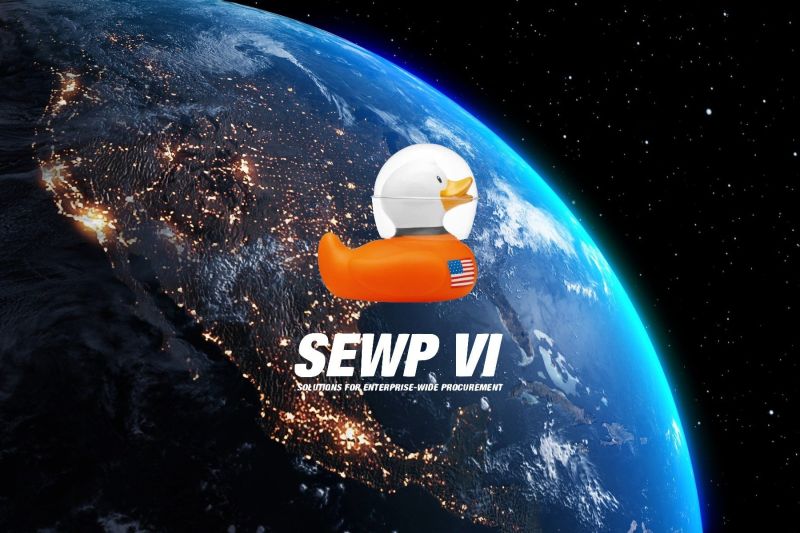
On June 25, NASA released Amendment 3 to its SEWP VI Final Request for Proposal (RFP). The amendment extends the submission deadline from July 11 to July 25 at 12:00 PM (ET). The other two changes correct minor errors in the RFP.
All revisions from Amendment 3, along with the previous two amendments, can be found in the SEWP VI SAM.gov notice. NASA hosted a webinar on SEWP VI Amendment 3 earlier this month. The recording and slides can be found here.
GSA Celebrates 75th Anniversary
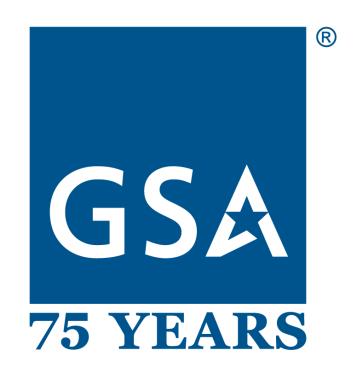
The General Services Administration (GSA) will celebrate its 75th anniversary on July 1 with a moderated discussion with Administrator Robin Carnahan at the Harry S. Truman Presidential Library and Museum in Independence, MO. Administrator Carnahan will discuss the agency’s founding and its accomplishments over the years.
“For the last 75 years, GSA has delivered outstanding customer experience and the best value in real estate, acquisition, and technology services to the government and American people,” said Administrator Carnahan. “I’m proud to work alongside thousands of dedicated public servants who are committed to making government work better for the people we serve and saving money while doing it.”
To register for the event, click here. It will also be recorded and published on GSA’s YouTube channel. To learn more about the establishment of GSA and how it has transformed government over the years, visit GSA’s 75th anniversary web page.
The President also recently wrote a letter in honor of GSA’s 75th anniversary.
Bill Aims to Eliminate Chinese Materials from U.S. Semiconductor Manufacturing
Last week, leaders of the House Science, Space and Technology Committee introduced a bipartisan bill aiming to add new language to the CHIPS and Science Act (CHIPS Act), reported NextGov. The Chip Equipment Quality, Usefulness, and Integrity Protection Act (Chip EQUIP Act) would prevent American businesses that receive CHIPS Act funding from obtaining “manufacturing equipment from China and other adversarial nations.” The proposed legislation comes as China boosts its own semiconductor industry by investing in efforts to “build a self-sufficient supply chain.”
The CHIPS Act was passed in 2022 to help foster development of the U.S. semiconductor supply chain and to reduce reliance on foreign manufacturers. Since the law passed, the White House has developed “multiple funding opportunities to support domestic fabrication plant creation and research efforts.”
Snapshot of FY23 Governmentwide Contracting
The Government Accountability Organization (GAO) released an interactive dashboard on governmentwide contracting in fiscal year (FY) 2023. GAO reported Federal agency commitments of $759 billion in contracts in FY23, a $33 billion increase from FY22 after adjusting for inflation. The Department of Defense (DoD) accounted for $456 billion of the contracts, while civilian Federal agencies made up $303 billion. A full breakdown of spending (left) and a chart displaying the most popular products and services purchased by the government (right) can be found here:
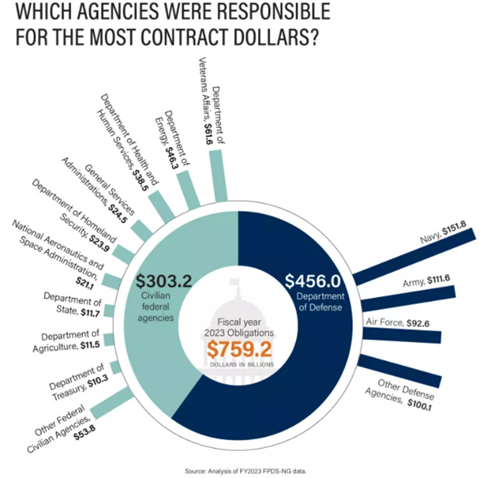
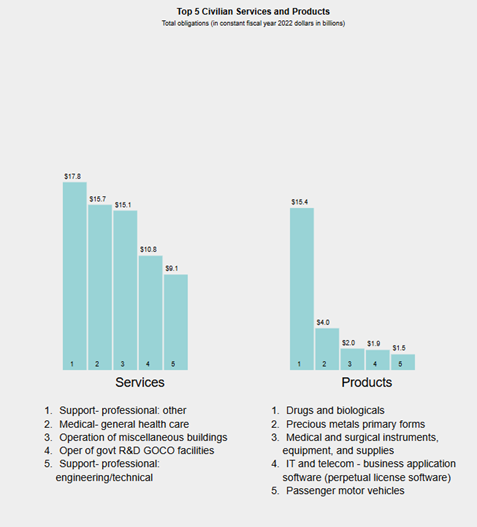
More charts regarding the Federal Government’s spending for FY23 can be found on the dashboard.
Bill Introduced to Promote Federal AI Awareness
Senators Todd Young (R-IN) and Brian Schatz (D-HI) introduced the Artificial Intelligence Public Awareness and Education Campaign Act. The bill “would require the Secretary of Commerce to carry out a public awareness and education campaign to provide information regarding the benefits of, risks relating to, and the prevalence of AI in the daily lives of individuals in the United States.” The bill also tasks the Commerce Department with conducting outreach about available AI roles in the government.
Specifically, the bill would require the public awareness campaign to cover:
- The rights of an individual under law with respect to AI;
- Best practices for detecting and differentiating AI-generated media, including media commonly referred to as “deepfakes” and content created by the programs commonly referred to as ‘‘chatbots’’;
- The prevalence of AI in the daily lives of individuals, including both commercial and personal applications; and
- Workforce opportunities, including opportunities to work in the Federal Government, for individuals with experience in the development, deployment, and use of AI.
GSA Receives Five Presidential Sustainability Awards

On June 25, the Administration announced the recipients of the inaugural Presidential Federal Sustainability Awards, five of which were awarded to GSA. The awards recognize Federal agencies, projects, and employees that “have made transformational efforts to advance sustainability and climate resilience and lead by example.” GSA was recognized for the following:
- Extraordinary Leadership on the Federal Buy Clean Initiative: GSA went above and beyond to source American-Made, lower-carbon construction materials. Engaging with suppliers helped spur 17,000 new Environmental Product Declarations for construction materials.
- First Federal 100 Percent 24/7 Carbon-Free Electricity Buy: GSA executed the first-ever whole of-government approach to procuring clean energy. This led to “the Federal Government’s first-ever contract for locally supplied CFE delivered on a 24/7 basis” which was awarded to a utility in Arkansas.
- Advancing Innovation while Strengthening a Massachusetts Community: This award, shared with the Department of Transportation, recognizes the opening of the John A. Volpe National Transportation Systems Center in Cambridge, Massachusetts.
- Electrifying D.C.’s Largest Building: GSA is currently electrifying the Ronald Reagan Building and International Trade Center, the largest building in Washington D.C. The project, which will cut energy use and emissions by about 50 percent each, is expected to finish in spring 2025.
- Improvements to the Oklahoma City Federal Building: GSA garnered an honorable mention award for their work transforming the Oklahoma City Federal Building into “high-tech clean energy hubs that generate their own energy and dynamically interact with the power grid to make it stronger.”
Comment Period Extended for Semiconductor Prohibition ANPR
GSA recently extended the comment period for responding to the FAR Case 2023-008: Prohibition on Certain Semiconductor Products and Services advanced notice of proposed rulemaking (ANPR). The Prohibition on Certain Semiconductor Product and Services rule will bar contractors from providing the government products, or services using products, that contain semiconductors from select manufacturers. The rule implements paragraphs (a), (b), and (h) in section 5949 of the James M. Inhofe National Defense Authorization Act for Fiscal Year 2023. The Coalition would like to thank members who’ve already contributed to our own draft comments, which can be found here. If you would like to provide feedback on our draft comments, please email Greg Waldron at gwaldron@thecgp.org by July 12th at 5:00 PM (ET).
Swing for Our Heroes at the Joseph P. Caggiano Memorial Golf Tournament

The 11th Annual Joseph P. Caggiano Memorial Golf Tournament is less than two months away! The Coalition for Government Procurement invites you to join us on August 21 to enjoy a day on the golf course while supporting some wonderful causes for veterans! The annual golf tournament, which will take place at the beautiful Whiskey Creek Golf Club in Ijamsville, Maryland, honors our dear friend and colleague Joe Caggiano, a Navy veteran and longtime expert in the Federal contracting marketplace with a career spanning over 25 years. Golfers of all skill levels are encouraged to participate with their friends and colleagues for the chance to win prizes!
The tournament features a scramble format with teams of four golfers. In addition, this year’s event includes a Longest Drive/Closest to the Pin contest. You can register a foursome, as an individual golfer, or enjoy the scenic views of the veranda club by clicking here.
Joe Caggiano, a veteran himself, served eight years as an officer in the United States Navy where he completed multiple tours of duty, including on the USS Independence, at Navy Personnel Command, and as an instructor at Villanova University. To honor Joe’s legacy, proceeds from the tournament will support two charitable causes dedicated to the brave men and women who have served our country.
The Coalition for Government Procurement Endowed Scholarship Fund

Since 2014, the Coalition has worked with The George Washington University (GWU) to fund a scholarship supporting a veteran who is concentrating their studies in U.S. procurement at the GWU Law School. We are grateful to have awarded eight accomplished veterans with this scholarship since 2017. Thanks to the continued generosity of our members, we have raised over $140,000 for the scholarship fund over the years. The Coalition is pleased to announce that this year’s scholarship recipient is Kristin Wolford Gillooly. Kristin is currently pursuing a Masters degree in Government Procurement and Cybersecurity Law at the GWU Law School. She is a Lieutenant for the Office of the Chief of Naval Operations and has received a Joint Commendation Medal for meritorious service in Afghanistan, as well as a Navy Commendation Medal for meritorious service in response to the war in Ukraine. We are thrilled to have Kristin join us at the tournament to introduce herself and give opening remarks.
Paws for Purple Hearts

Last year marked the inaugural time that we supported a new charity organization, Paws for Purple Hearts (PPH), through the Joseph P. Caggiano Memorial Golf Tournament. We are excited to announce that proceeds from this year’s golf tournament will once again support PPH! PPH is the first program of its kind that improves the lives of veterans and wounded service members facing mobility challenges and trauma-related conditions, including post-traumatic stress disorder (PTSD) and traumatic brain injury (TBI), through assistance dogs and its unique Canine Assisted Warrior Therapy® program. PPH was founded in 2006 as a research program at the prestigious Bergin College of Canine Studies and has since evolved into its own non-profit organization.
Through working with PPH over the past two years, members have learned how service dogs play an important role in veterans’ healthcare and quality of life. Since 9/11, nearly half of service members have returned home with a service-connected disability, and a large percentage of that group experiences some level of PTSD, TBI, or another mental health condition. Service dogs help these veterans by reducing the severity of their symptoms like anxiety and stress, performing tasks for those with physical limitations, and promoting social interaction and integration with others.
PPH has held over 15,000 therapy sessions and directly impacted the lives of more than 10,000 veterans and wounded service members. Watch a video on PPH’s dedication to improving the lives of veterans across the country here. Thanks to the outstanding generosity of our sponsors and members, we raised $11,000 for this wonderful cause in 2023. We look forward to continuing this support, and meeting some new service dogs, at the 2024 tournament!
Thank You to Our Current Sponsors of the Joseph P. Caggiano Memorial Golf Tournament!
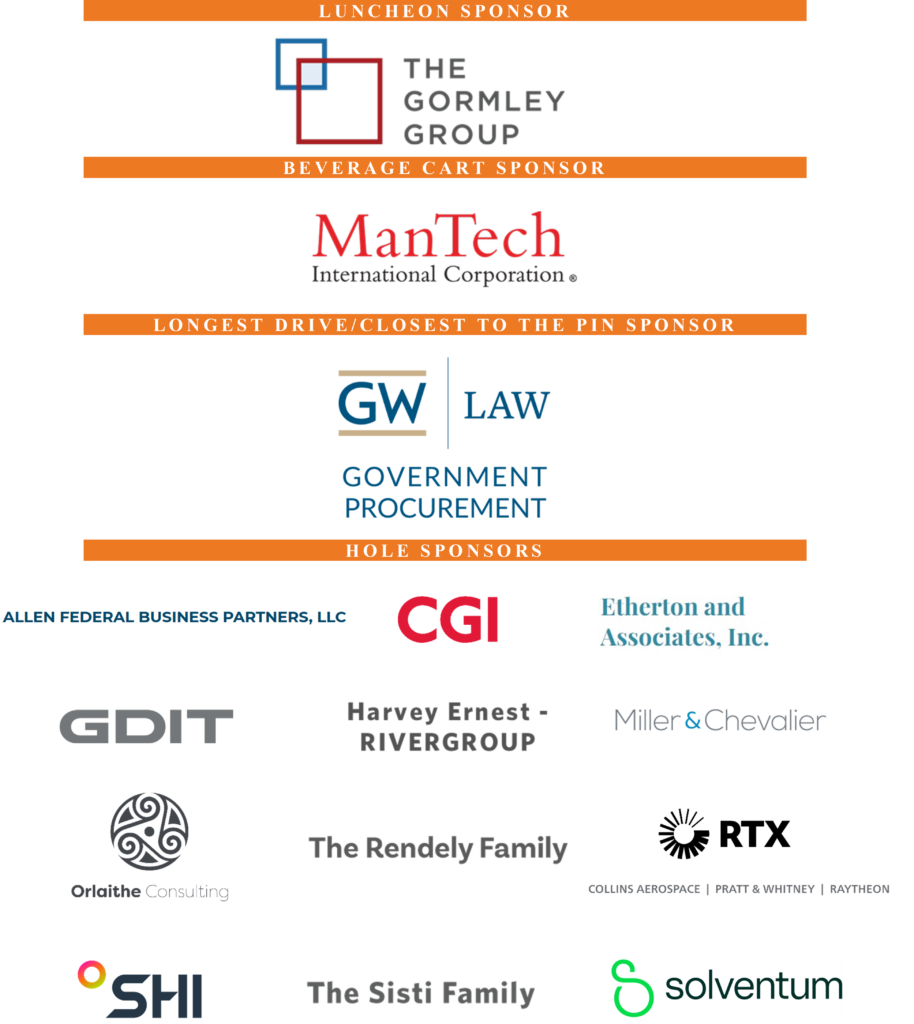
If your company is interested in supporting the tournament while also gaining exposure for your brand, there are many sponsorship opportunities available.
- Title Sponsorships – $6,000/each
- Reception Sponsorships – $4,000/each
- Lunch Sponsorships – $4,000/each
- All-Day Beverage Cart Sponsorships – $2,500/each
- Hole Sponsorships with 4 Players – $1,200/each
- Veranda Club Sponsorships – $150/each
- Hole Sponsorships (no players) – $500/each
- Golf Foursomes – $800/each
- Single Golfer – $210/each
View the full list of sponsorship opportunities here. For more information, please contact Heather Tarpley at htarpley@thecgp.org.
Legal Corner: Data, Deals, and Diplomacy: How the Bulk Data Executive Order Will Shape Future Contracts and Security Practices
Authored by Townsend Bourne and Jordan Mallory; Sheppard Mullin
The Legal Corner provides the procurement community with an opportunity to share insights and comments on relevant legal issues of the day. The comments herein do not necessarily reflect the views of The Coalition for Government Procurement.
For companies in the U.S. that hold certain personal data and U.S. Government-related data, rules stemming from recent Executive Order (“EO”) 14117 on “Preventing Access to Americans’ Bulk Sensitive Personal Data and United States Government-Related Data by Countries of Concern” may create obstacles and new compliance obligations. Under this EO, the Attorney General is charged with issuing regulations to either outright prohibit or impose restrictions on transactions involving bulk sensitive personal data or U.S. Government-related data when such transactions involve a “country of concern.”
A Department of Justice (“DOJ”) Advanced Notice of Proposed Rulemaking (“ANPRM”) forecasts what some of the contours of the eventual regulations could look like, as discussed below.
Types of Data Covered
The EO identifies two classes of data that will be covered by the regulation: bulk sensitive personal data and U.S. Government-related data.
The ANPRM outlines six categories of data to be considered bulk U.S. sensitive personal data: (1) covered personal identifiers; (2) geolocation and related sensor data; (3) biometric identifiers; (4) human genomic data; (5) personal health data; (6) personal financial data.
For bulk sensitive personal data, there is a yet-to-be-determined volume threshold that must be involved in the transaction for it to be covered. Each data category will have a different volume threshold depending on its sensitivity, and combined data categories are covered if the volume surpasses the lowest of the thresholds in those data categories. Suggested thresholds in the ANPRM range from data sets on 100 U.S. persons for highly sensitive data to more than 1,000,000 U.S. persons for less sensitive data categories.
The ANPRM considers two categories under U.S. Government-related data:
- Precise geolocation data for government related locations, which refers to location data within a yet-to-be-determined level of accuracy within a yet-to-be-enumerated list of geofenced areas associated with military, government, and other sensitive facilities (there will be a “Government-Related Location Data List”).
- Sensitive personal data that a party markets as linked or linkable to current or recent former employees or contractors, or former senior officials, of the U.S. Government (e.g., company advertises the sale of personal data of active duty personnel or data set on members of a specific organization limited to military members and their families, such as USAA).
For U.S. Government-related data, there is no threshold requirement and the data categories will be covered regardless of volume.
Prohibitions and Restrictions
The ANPRM identifies certain classes of transactions that will be prohibited and those that will be restricted. Prohibited transactions include selling or licensing access to covered data – “Data Brokerage Transactions” – and transactions for bulk genomic data and human biospecimens from which genomic data can be derived. To be prohibited, the transaction must involve a country of concern. The ANPRM is considering identifying the following countries as countries of concern: China (including Hong Kong and Macau), Russia, Iran, North Korea, Cuba, and Venezuela.[1]
Vendor agreements, employment agreements, and investment agreements involving potential access by a country of concern to covered data will be restricted, requiring compliance with specific security measures to be determined by the Cybersecurity and Infrastructure Security Agency (“CISA”). The ANPRM includes suggested frameworks for CISA to draw on for these measures, including the CISA Cybersecurity Performance Goals (“CPG”), the National Institute of Standards & Technology (“NIST”) Cybersecurity Framework (“CSF”), the NIST Privacy Framework (“PF”), and NIST SP 800–171 rev. 3, Protecting Controlled Unclassified Information in Nonfederal Systems and Organizations.
Impact of the New Regulations
The new regulations will impact businesses with operations in or transactions involving countries of concern and covered persons related to those countries. This includes vendor agreements, employment agreements, and investment agreements that may enable access to covered data by countries of concern and covered persons if certain security measures are not in place. Companies should be cognizant of data hosting or cloud services in a country of concern, of employees that are citizens of and reside in a country of concern with access to covered data, and of foreign investment[2] from a county of concern.
Government contractors may benefit from an “Official business” exemption which would except otherwise covered transactions performed pursuant to a government contract or grant. Note this exemption is contemplated so that government agencies may craft their own contract and grant conditions to control risk of access to covered data.
The DOJ will issue a proposed rule (currently due at the end of August) based on feedback received on the ANPRM, followed by another comment period, and then a final rule. Because we currently are in the early stages of rulemaking, we expect there to be changes and (hopefully) more clarity by the time we arrive at a final rule. However, companies that hold sensitive information and have operations or vendors in identified countries of concern should stay up-to-date on developments in this space and take steps to prepare for the final rule by identifying potential transactions prohibited or restricted by the rule as well as implementing security measures that may mitigate identified risks.
FOOTNOTES
[1] This initial list is drawn from EO 13873, which identified these countries as “having engaged in a long-term pattern or serious instances of conduct significantly adverse to the national security of the United States or security and safety of the United States.”
[2] The ANPRM contemplates a coordination with the Committee on Foreign Investment in the United State (CFIUS), whereby the DOJ would regulate covered data transactions until CFIUS takes action related to the transaction.
Healthcare Spotlight: Introducing ‘Coalition Consults’ for Healthcare Members
The Coalition is excited to introduce a new resource for our healthcare members, called Coalition Consults. The first set of Consults address key contracting programs at the U.S. Department of Veterans Affairs (VA) for medical/surgical supply and medical device companies. The Consults provide basic information about the product scope of each contract and how companies can pursue these contracts, including the appropriate VA contacts. Coalition Consults are currently available for the following VA contracts:
- VA Med-Surg Prime Vendor (MSPV) program
- VA & DoD High Tech Medical Equipment (HTME) program
- VA Medical Device Implant program
- VA Non-Expendable (NX) Program
To access the Coalition Consults, click here. For any questions, please contact Joseph Snyderwine at jsnyderwine@thecgp.org.
View from Main Street: Important Value-Added Technology Reseller Size Decision
Updates on Timely Topics Impacting the Government Contracting Industry from the Coalition’s Vice President of Acquisition Policy, Ken Dodds
For purposes of calculating size under a size standard based on annual receipts, receipts mean “total income” plus “cost of goods sold” as those terms are defined and reported on federal tax returns.[1] There are some exclusions for size determination purposes, but those exclusions are limited to those identified in the Small Business Administration’s (SBA) regulations. A firm’s size is calculated based on its average annual receipts over the firm’s five most recently completed fiscal years.[2] Federal tax returns filed before the date of size self-certification must be used to calculate size.[3] When a firm has not filed a tax return for a completed fiscal year, SBA will use other available information to calculate receipts for that fiscal year, “such as the concern’s regular books of account, audited financial statements, or information contained in an affidavit by a person with personal knowledge of the facts.”[4]
In a recent size appeal, the SBA Area Office found the appellant to be other than small, even though the firm was small based on its federal tax returns. The firm was a value-added technology reseller, and the SBA Area Office was in possession of the firm’s financial statements. For federal tax purposes, the firm had not included the full costs of goods sold on its tax returns. The firm and its accountant claimed that it was common practice for value-added technology resellers to only report the net revenue or difference between the sale price and the price of the product for federal tax purposes. If the full cost of goods sold were included in calculating the firm’s size, the firm would be other than small. The SBA Area Office, citing a Federal District Court decision involving the False Claims Act, found that the firm could not exclude some of the cost of goods sold from its receipts for size determination purposes because they were not identified as an exclusion in SBA’s regulations.
SBA’s Office of Hearings and Appeals (OHA) granted the appeal, vacated the size determination, and remanded to the SBA Area Office.[5] OHA rejected SBA’s argument that SBA can use other financial information to make a size determination if it believes that a tax return does not include all receipts. According to OHA, if filed tax returns are available, they must be used to calculate size. OHA also pointed out that SBA was not a party to the District Court False Claims Act case and that the decision was not binding on SBA.
Hopefully, SBA will address this issue through regulation and clarify that if value-added technology resellers can legally exclude some “cost of goods sold” for federal tax purposes, they are also excluded for size determination purposes. The exclusions for size determination purposes in SBA’s regulations should be limited to items that are reported for federal tax purposes but are excluded for size determination purposes for policy reasons. But SBA also needs the flexibility to look beyond a federal tax return if the tax return is false or inaccurate. Years ago, there was a size protest involving an employee-based size standard, where the firm in question was claiming, and reporting to the Internal Revenue Service (IRS), that certain individuals were independent contractors, not employees. Eventually, SBA and the IRS rejected the firm’s claims, finding the individuals were indeed employees.[6] The important thing is getting the size calculation right. Generally, what is reported to the IRS should be used to calculate size, but not if it is false and the IRS has not caught it, yet.
[1] 13 CFR 121.104(a).
[2] 13 CFR 121.104(c)(1).
[3] 13 CFR 121.104(a)(1).
[4] 13 CFR 121.104(a)(2).
[5] Size Appeal of Colossal Contracting, LLC, SBA No, SIZ-6285 (2024).
[6] Robert W. Wood, Independent Contractor vs. Employee and Blackwater, 70 Mont. L. Rev. 95 (Winter 2009).
Off the Shelf: The Purpose and Scope of the Committee on Foreign Investment in the US (CFIUS)

Tim Keeler, Partner and Co-Head of the International Trade team at Mayer Brown, joined Off the Shelf to describe the Committee on Foreign Investment in the United States (CFIUS) and its role in maintaining national security.
Keeler explains the structure, purpose, and scope of CFIUS, and the basis on which CFIUS reviews covered transactions involving foreign investments in the U.S. industrial base. Next, Keeler speaks about key considerations regarding potential mergers and acquisitions involving foreign investors and trends he sees in the CFIUS decision-making process.
To conclude the show, Keeler identifies and explains key developments in international trade and trade agreements.
Listen to the full podcast here.
Coalition Meetings on GSA’s FAS Catalogue Platform and IT Small Business Opportunities
On Monday, the Coalition’s General/Office Products Committee hosted Peter Han, Branch Chief, Catalog Management Office, GSA. During the meeting, he provided an update on the FAS Catalog Platform (FCP) Rollout and responded to member feedback and challenges regarding robomods.
To access GSA’s slides, click here.
To access the Coalition’s policy update slides, click here.
Additionally, on Wednesday, the Small Business Committee hosted a meeting with:
- Clarence Harrison Jr., Senior Advisor, FAS;
- Warren Blankenship, Deputy IT Government-wide Category Manager, FAS; and
- Angela Washington, Office of Business Centers, Minority Business Development Agency (MBDA), U.S. Department of Commerce (DoC).
At the meeting, members shared their feedback on the challenges small businesses face in the Federal IT marketplace and what the government can do to increase the number and utilization of small business Value Added Resellers. GSA plans to gather more feedback as they develop recommendations and will share a finalized report when ready.
The Coalition thanks GSA and the DoC for engaging with industry and looks forward to continued dialogue.
Green Committee Meeting: Impacts of the New FAR Part 23 on Sustainable Acquisition, July 9
On July 9 at 1:00 PM (ET), the Green Committee will host a members-only presentation from the Environmental Protection Agency (EPA) on ecolabels and sustainable procurement. Guest speakers will be Jenna Larkin, the Acting Section Lead for the EPA’s Environmentally Preferable Purchasing (EPP) Program, and Jonathan Rifkin, a Specialist and sustainable acquisition expert on the EPP team.
Jenna and Jonathan will break down the FAR Council’s recently adopted Sustainable Procurement rule, effective as of May 22, which reorganizes and condenses the Federal Government’s approach to sustainable purchasing. They will also cover recent developments regarding the EPA’s Ecolabels program.
To register for this members-only meeting, click here. For any assistance with registration, please contact Madyson Whiting at mwhiting@thecgp.org.
If you have advance questions for Jenna and Jonathan about the Sustainable Procurement rule, please email Greg Waldron at gwaldron@thecgp.org by July 2, COB.
New Webinar: The BIOSECURE Act’s Potential Impact on the Biotechnology Supply Chain, July 10

Taking a page out of playbook used to establish the framework that excludes products of certain Chinese telecommunications companies from the federal market (e.g., the “Huawei ban”), the BIOSECURE Act would prohibit the federal government from purchasing biotechnology equipment or services from certain “companies of concern.” The Act does not stop there. It would also prohibit Executive agencies from contracting with a company that would use biotechnology equipment or services from a “biotechnology company of concern” in the performance of a federal contract.
Please join the Coalition for a webinar on July 10 from 11:30 AM – 12:30 PM (ET) as we host four attorneys from Hogan Lovells’ Global Regulatory practice. Partners Joy Sturm, Mike Druckman, Ajay Kuntamukkala, and Tim Bergreen, Senior Counsel, will brief attendees on the latest regarding the BIOSECURE Act. They will outline what contractors need to know about the Act, including the key terminology, scope, and applicability, and will speak to its implications within the biotechnology sector. They will also speak about potential U.S. trade sanctions that could be applied to restrict business with companies of concern and others considered to pose a national security threat. Finally, the team will discuss key compliance practices and steps companies can take to keep up with the evolving landscape impacting the biotechnology supply chain.
To register, click here. For any assistance with registration, please contact Madyson Whiting at mwhiting@thecgp.org.
Who is Eligible to Buy from the Schedules? July 11
On July 11 at 10:00 AM (ET), Thomas O’Linn, Senior Procurement Policy Analyst, Acquisition Policy Division of the Office of Government-Wide Policy at the General Services Administration, will be speaking at a meeting hosted by the Coalition’s Furniture/Furnishings Committee to provide an update on the Eligibility Process for using GSA sources of supply (e.g., contract vehicles). The meeting will be open to all members and held virtually. GSA will explain what entities, in addition to Federal agencies, are eligible to purchase from the Schedules program and FAQs on the subject.
To register for this virtual members-only meeting, click here. For any assistance with registration, please contact Madyson Whiting at mwhiting@thecgp.org.
Please provide any questions on this subject for GSA to address during the meeting to Greg Waldron at GWaldron@thecgp.org by July 1.
New Webinar: Upcoming CMMC Cybersecurity Requirements & How They Apply to Healthcare Contractors, July 31
The following CMMC webinar is open to Coalition and AMSUS-SM members.

With the rise of DoD cyber enforcement and the near completion of the Cybersecurity Maturity Model Certification (CMMC) program, join Crowell & Moring government contracts attorneys Michael Gruden and Payal Nanavati specializing in cybersecurity and healthcare, respectively, for a webinar overview of CMMC requirements for companies working in the Healthcare sector and the unique requirements companies should be mindful of working in this space.
Key topics covered will include:
- Overview of CMMC Scoping, Documentation Requirements and Implementation Timeline;
- How to determine whether Protected Health Information (PHI) or Controlled Unclassified Information (CUI) is handled by your company;
- Understanding PHI and CUI handling requirements;
- Understanding Commercially Off the Shelf (COTS) determinations and related exemptions; and
- Healthcare & Cybersecurity Enforcement Risks.
To register, click here. For any assistance with registration, please contact Madyson Whiting at mwhiting@thecgp.org.
Pharmaceutical Pricing Summer Webinar Series

Welcome to the “Pharmaceutical Pricing Fun in the Sun Summer Webinar Series”! Join us for five weeks in July and August as we dive into the intricate and dynamic world of pharmaceutical contracts and pricing. This five-part series is designed to enlighten and engage professionals across the industry, offering invaluable insights into pricing strategies, regulations, market trends, and much more.
Speakers:
- Stephen Ruscus, Partner at BakerHostetler
- Greg Madden, Managing Member at Orlaithe Consulting
To register for the webinar series, click here. For any assistance with registration, please contact Madyson Whiting at mwhiting@thecgp.org.
July 11: Don’t Mistake an AMP for a WAMP – Key Characteristics for 5 Key Federal Health Care Programs
July 11, the first part of the Pharmaceutical Pricing “Fun in the Sun” Summer Webinar Series. In this detailed webinar, presenters Stephen and Greg will break down the essential characteristics of five key federal healthcare programs, including: Medicaid; Medicare Part B; Medicare Part D; The 340B Program; and The VA Veterans Healthcare Act
During the webinar, Stephen and Greg will discuss the critical distinctions between Average Manufacturer Price (AMP) and Weighted Average Manufacturer Price (WAMP) and their implications for both brand and generic drugs. Additionally, they will highlight and discuss a top issue impacting each program, providing you with the insights needed to stay compliant in this evolving landscape. Register today to gain a comprehensive understanding of these programs and their impact on pharmaceutical pricing.
July 18: The FSS Contract – 5 Key Legal, Pricing, Compliance, Finance and Contracts Issues
July 18, for an in-depth webinar focused on the Department of Veterans Affairs’ Federal Supply Schedule (FSS) Program. This session will explore five key aspects of an FSS contract that are recognized as essential by legal, pricing, compliance, finance, and contracts professionals. Stephen and Greg will provide valuable insights into the intricacies of negotiating and managing FSS contracts for brand drugs, generic drugs, and medical devices. Attendees will gain a comprehensive understanding of the strategic considerations, regulatory requirements, pricing strategies, and compliance issues critical to maintaining successful FSS agreements. Don’t miss this opportunity to enhance your knowledge and ensure your organization’s adherence to best practices in FSS contracting.
July 25: Public Law Season Is Fast Approaching – What Do I Do?
As public law season rapidly approaches, it is crucial to stay informed and prepared, especially for drugs marketed under New Drug Applications (NDAs) and Biologics License Applications (BLAs). Join us on July 25 for a timely and informative webinar as Stephen and Greg will guide you through the essential steps to navigate public law season.
During the webinar, Stephen and Greg will cover the latest compliance requirements and strategic considerations that impact pricing, including:
- Why and how are my prices capped?
- What is the calculation?
- What are 5 key considerations for my organization in reporting pricing?
- What are the relevant processes and timetables?
- How does the statutory calculation affect my contracts?
Don’t miss this opportunity to equip yourself with the knowledge and tools needed to successfully navigate the upcoming public law season.
August 1: Domestic Sourcing Requirements – The Old and the New
we are pleased to have Stephen and Greg present an insightful webinar dedicated to understanding the evolving landscape of domestic sourcing requirements for brand drugs, generic drugs, and medical devices. This session will delve into both the established regulations and the latest updates affecting sourcing practices, including:
- The Buy American Act;
- Critical Component and Critical Item Heightened Requirements
- Increasing Component Cost Requirements
- The Trade Agreements Act; and
- Political Developments Focusing Domestic Sourcing Requirements on China and National Security.
During the webinar, Stephen and Greg will discuss the implications of these requirements on supply chains, compliance strategies, and overall business operations. Attendees will gain a comprehensive overview of these requirements and learn how to navigate the complexities of domestic sourcing in today’s market.
August 15: The FSS Contract Revisited – Handling 5 Other Key Issues
On August 15, we will wrap up the summer webinar series with Part 2 of our deep dive into the Federal Supply Schedule (FSS) Program. Building on the foundational knowledge shared in our previous session, “The FSS Contract – 5 Key Things Legal, Pricing, Compliance, Finance, and Contracts All Agree Are Important,” this webinar will address five additional critical and emerging aspects of FSS contract compliance that are not price related.
During this webinar, Stephen and Greg will provide advanced insights and address additional complex issues related to negotiating, managing, and maintaining FSS contracts for brand drugs, generic drugs, and medical devices. Whether you attended the first webinar or are new to the topic, this session will enhance your understanding and help ensure your organization’s success in the FSS contracting landscape. Don’t miss this opportunity to deepen your expertise and stay current with best practices in FSS contracting.
VA Data for Healthcare Members
To increase the number of valuable tools available for members, the Coalition has compiled several data sets pertaining to VA Medical Centers’ procedures, diagnoses, and product spend. Below is a description of the different VA data reports that the Coalition can provide to healthcare members based on areas of interest to their business:
- Diagnosis data by each VA Medical Center: Members can request a report by providing the relevant International Classification of Diseases (ICD)-10 codes of interest to their business.
- Procedure data by each VA Medical Center: Members can request a report by providing the relevant Current Procedural Terminology (CPT) codes of interest to their business.
- Prosthetic (medical implants, DME) product spend by VA Medical Center: members can request a report by providing the relevant Healthcare Common Procedure Coding System (HCPCS) codes of interest to their business for items managed by VHA Prosthetics.
For any data requests or related questions, please contact Michael Hanafin at mhanafin@thecgp.org.